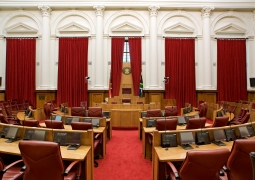
The Minister of Human Settlements, Water and Sanitation, Ms Lindiwe Sisulu, briefed the National Council of Provinces (NCOP) in a virtual plenary on progress in providing vulnerable communities with water, sanitation and other human settlement-related challenges in response to the Covid-19 pandemic.
In welcoming Ms Sisulu, NCOP Chairperson Mr Amos Masondo emphasised the importance of water in a time of pandemic. “Water is important in saving lives and livelihood, especially,” he said, “at a time when the world is faced with this global pandemic, which has been exacerbated by global warming leading to water pollution and ageing infrastructure.”
Given the immense water challenges, Mr Masondo said there is a need for sustainable solutions to the scarcity of water in the country. “Given the fact that water is a constitutional right, the state has an obligation to come up with legislation to achieve the realisation of this right.”
Another perennial challenge are droughts, especially in rural areas. These challenges have brought about a need for intergovernmental interventions from national, provincial and local government to promote coordination and cooperation in dealing with water issues.
Mr Masondo then went on to mention the recent auditor-general’s reports which painted a bleak picture of poor governance in many municipalities across South Africa. “What is at stake is whether public resources are used effectively. The audit outcomes of 2018/19 found poor public finance management, including fruitless and wasteful expenditure, which is disturbing,” he said. This is worsened even further by “non- compliance by municipalities with key legislation on supply-chain management”.
Handing over to the Chief Executive Officer of Water Rand, Mr Sipho Mosai, to deliver the presentation, Ms Sisulu said: “We could not hope to deal with the problem of the shortages of water all at once. We will continue with our interventions until we find a lasting solution to this matter.”
Mr Mosai told NCOP delegates that part of its response to the pandemic included the formation of a national command centre to coordinate its response to the pandemic. Although this is a short-term measure, various innovations have accelerated service delivery to communities. The department has decentralised water delivery so more water can be delivered to the areas that need it most. “Through the centralised procurement processes, there is now transparency and this has created easy access to the department’s procurement account, which will assist for auditing purposes.”
On human settlement, the water and sanitation department reported that some vulnerable households have been provided with sanitisers. Others now receive water and sanitation services. In the case of overpopulated hostels and congested inner city areas, people have been relocated to less densely populated areas. The NCOP heard that over 40 000 subsidy units have been occupied in this way, to ensure that people can practice social distancing and self-isolation when a need arises.
During question and answer time, Ms Sisulu said the department’s housing master plan has been commended by the International Monetary Fund. This recognition came for the department’s swift reaction in providing destitute homeless families of Roodeport with proper family households through the strategic interventions of the master plan.
NCOP delegates wanted to know why evictions are still taking place, when there is currently a moratorium on evictions. Ms Sisulu responded: “The challenge is to balance the moratorium against the surge in land invasion. Land invasions are illegal and are a law-enforcement matter.” However, she condemned the recent humiliating eviction saga in Cape Town. “Once people have put up structures, the municipality involved must approach the courts to get an eviction order. But no one deserves to be humiliated as much as what happened to the Cape Town resident recently. We have taken this matter to court for a review.”
Asked how the department intends to deal with revenue loses caused the pandemic, she said: “We have devised a plan to deal with that. We will share it with the NCOP in due course.”
When asked about schools that are still without water, she said the department has provided all the schools that were allocated to it by the Department of Education. Those that are still without water were not included in the delivery plan received from the Department of Education.
Quizzed about municipalities owing money to water boards, she said the debt amounts to R9.9 billion, but that cutting water supply is not a solution. “We think the NCOP can perhaps assist in this regard, given that they represent provincial interests, where municipalities are located.”
NCOP delegates also asked how the department deals with reports of corruption in the department. “We inherited an environment with untold corruption and there has been a great deal of resistance in dealing with it, but we are forging ahead,” said Ms Sisulu. “We have enlisted the support of the Public Protector and the National Prosecution Authority to deal with it because it affects our core mandate of providing water and sanitation.”
Abel Mputing
8 July 2020

